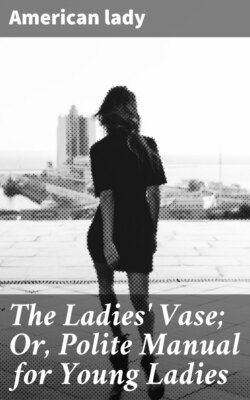Читать книгу The Ladies' Vase; Or, Polite Manual for Young Ladies - American Lady - Страница 6
На сайте Литреса книга снята с продажи.
TRUE AND FALSE POLITENESS.
ОглавлениеTable of Contents
Every thing really valuable is sure to be counterfeited. This applies not only to money, medicine, religion, and virtue, but even to politeness. We see in society the truly polite and the falsely polite; and, although all cannot explain, all can feel the difference. While we respect the one, we despise the other. Men hate to be cheated. An attempt to deceive us, is an insult to our understandings and an affront to our morals. The pretender to politeness is a cheat. He tries to palm off the base for the genuine; and, although he may deceive the vulgar, he cannot overreach the cultivated. True politeness springs from right feelings; it is a good heart, manifesting itself in an agreeable life; it is a just regard for the rights and happiness of others in small things; it is the expression of true and generous sentiments in a graceful form of words; it regards neatness and propriety in dress, as something due to society, and avoids tawdriness in apparel, as offensive to good taste; it avoids selfishness in conduct and roughness in manners: hence, a polite person is called a gentle man. True politeness is the smoothness of a refined mind and the tact of a kind heart.
Politeness is a word derived from the Greek word polis, which means a city—the inhabitants of which are supposed, by constant intercourse with each other, to be more refined in manners than the inhabitants of the country. From polis, comes our English word polish, which signifies an effect produced by rubbing down roughnesses until the surface is smoothed and brightened: hence, we speak of polished minds and polished manners. Persons in good society rub against each other until their sharp points are worn down, and their intercourse becomes easy. The word urbanity comes from the Latin word urbs; that, also, means a city, and it signifies politeness, gentleness, polish, for a similar reason.
In mingling with our fellow-men, there is a constant necessity for little offices of mutual good will. An observing and generous-minded person notices what gives him offense, and what pleases him in the conduct of others; and he seeks at once to correct or cultivate similar things in himself. He acts upon the wise, Christian principle of doing to others as he would have them do to him. Hence, in dress and person, he is clean and neat; in speech, he is courteous; in behavior, conciliating; in the pursuit of his own interests, unobtrusive. No truly polite person appears to notice bodily defects or unavoidable imperfections in others; and, above all, he never sneers at religion, either in its doctrines, ordinances, or professors.
False politeness is but a clumsy imitation of all this. It is selfish in its object, and superficial in its character. It is a slave to certain forms of speech, certain methods of action, and certain fashions of dress. It is insincere; praising where it sees no merit, and excusing sin where it beholds no repentance. It is the offspring of selfishness; perverting the golden rule by flattering stupidity and winking at vice, with the hope of being treated in the same way by the community. It is a bed of flowers, growing over a sepulchre, and drawing its life from the loathsome putrefaction within.
Yet, insincere and wrong as are the motives to false politeness, it is, after all, better than vulgarity. It is the cotton batting, that keeps the glass vases of society from dashing against each other "Familiarity," says the proverb, "breeds contempt;" and this is found true, whenever coarse minds with rude manners come in contact. Careless of the little decencies of society; selfish in selecting the best seat in the room, or the best dish at the table; unwashed in person, and slovenly in dress: what is this but an open proclamation of utter disregard for others? How soon contempt must follow!
Let the young polish their manners, not by attending to mere artificial rules, but by the cultivation of right feelings. Let them mingle with refined society as often as they can; and, by refined society, I do not mean those whom you find in the ball-room—in the theater—in the crowded party, or those—however wealthy, or richly dressed—you feel to be only artificially polite; but I mean those who make you feel at ease in their society, while, at the same time, they elevate your aims and polish your manners. What a good style is to noble sentiments, politeness is to virtue.
